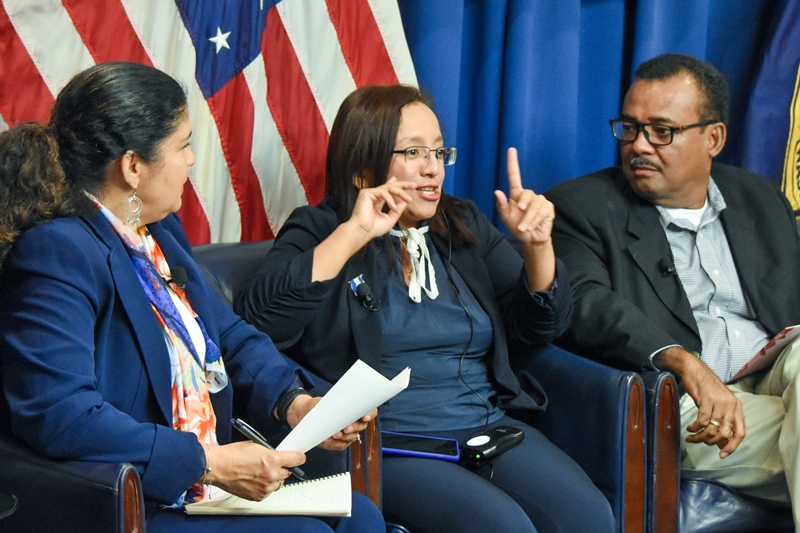Nicaraguan journalists lament country’s erosion of press freedom
 Lucía Pineda Ubau, news director at 100% Noticias (center). Photo: Alan Kotok
Lucía Pineda Ubau, news director at 100% Noticias (center). Photo: Alan Kotok
Journalists in Nicaragua fear for their lives daily as they face constant harassment, violence, intimidation and censorship, a panel of reporters and editors from Nicaragua said Wednesday at the National Press Club.
Nicaragua's President Daniel Ortega has cracked down on protests against his presidency, the journalists said. Journalists in Nicaragua have been arrested, beaten and had their equipment confiscated.
Panelist Lucía Pineda Ubau, news director at 100% Noticias, was arrested and jailed last December and remained in solitary confinement until June. Ortega’s treatment of reporters, which includes accusing them of inciting terrorism, is a “worldwide source of shame," Pineda Ubau said.
The government’s actions have forced reporters who do not work for the state-operated media to go underground. Private news organizations have had their signals blocked, offices and equipment seized, and websites taken down by government operatives.
“You could say we’re kind of working in a clandestine way,” Pineda Ubau said through an interpreter.
Pro-government mobs in Nicaragua set fire to radio station Radio Dario in April 2018, forcing the staff to move operations to another location and prompting director and owner Anibal Toruno to flee to Miami. He recently returned to Nicaragua and said he had been given the strength to return by those who stayed behind, even though his life is in danger every day.
“Daniel Ortega creates fear, threats, and he wants to put us in exile and not return,” Toruno said through an interpreter.
As many as 90 Nicaraguan journalists have fled the country, including Carlos Fernando Chamorro, the founder and editor of news organization Confidencial who now lives in Costa Rica. Some of his staff remains in Nicaragua.
Chamorro said news gathering continues despite the culture of fear Ortega has created among journalists. He said that Confidencial is now reliant on its website and social media, such as YouTube, to get stories out.
“To me, it’s a sort of pride that in the darkest hours of repression in Nicaragua, reporters have done a lot of reporting still,” Chamorro said through an interpreter.
Despite the challenges, Chamorro said journalists would continue doing their work inside and outside the country, supported by citizens who use social media to show the truth of what is going on and cannot be stopped by censors.
“They stole our cameras, that’s fine,” he said through an interpreter. “We continued doing our reporting.”
But he called on the international community to not forget about the situation in Nicaragua even amid other crises across the world. With foreign and domestic pressure, Ortega can be driven from power, he said.
“The change is coming,” Chamorro said.
